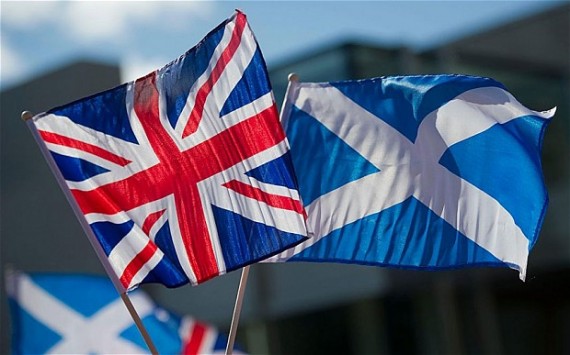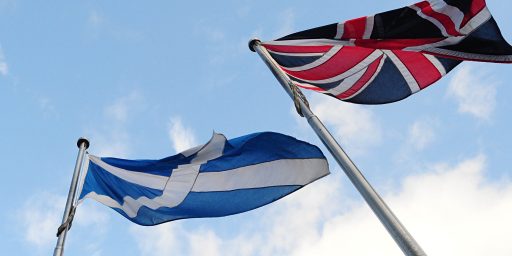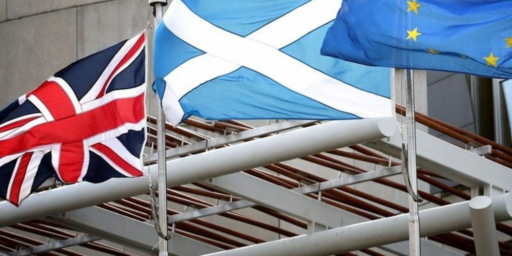Final Election Eve Poll In Scotland Finds ‘No’ Leading By Six Points
As this post is being written, voters in Scotland have been heading to the polls for roughly seven hours, and polls will remain open until 10pm local time, or 5pm U.S. Eastern time. By all accounts, turnout is expected to be quite high, and neither side is claiming that they are assured of victory. However, the final poll released on the eve of voting showed the ‘No’ side leading by six points, suggesting that there has been surge toward the United Kingdom in the last week or so:
The campaign to keep Scotland in the Union has increased its narrow lead, according to the last referendum poll
An Evening Standard/ Ipsos Mori poll, conducted on Tuesday and Wednesday, found that the No campaign had taken a six point lead in the run up to the referendum.
It found that six in 10 of those voting for Scotland to stay in the union were motivated more by “fear” about the risks of independence than “hope” for the future. By contrast eight in 10 Yes voters said they were motivated more by hope than fear.
The poll highlighted a significant gender divide, with men 53 per cent of men favouring independence while 58 per cent of women said they intended to vote for Scotland to stay in the union.
People aged between 35 and 34 were the most likely to vote yes, dividing 73 to 27, while those over-55 were split two to one in favour of Scotland staying in the Union.
Reports from the British media are saying that we shouldn’t expect a final result until some time early tomorrow morning, which means that most of the United States will have to wait until wakes up to find out the results. As many observers have noted, the fact that turnout is expected to be quite high, some estimates put it at 85% or higher across all of Scotland, the polls may not be telling the entire story of what is likely to happen. That being said, and based solely on what I’ve read from analysts on the other side of the Atlantic, my guess is that Scotland will, in the end, reject independence notwithstanding the emotional and patriotic appeals. Since I’m hardly an expert on Scottish politics or the state of public opinion there, it’s not a guess I’m placing a huge amount of confidence in, but it strikes me that if independence was going to win, we’d see stronger evidence of that in the polling right now.
In any case, by this time tomorrow we should know how it all turned out and whether or not the United Kingdom will remain, well, united.




The ipsos/mori poll has always shown the largest margin towards “No”. What is perhaps most significant is that this latest poll shows a +7% swing towards YES over their last poll. It’ll be closer than the mainstream media thinks – as George Monbiot writes, its hardly been unbiased coverage. http://www.theguardian.com/commentisfree/2014/sep/16/media-shafted-people-scotland-journalists?CMP=fb_gu
Damn, I was sort of hoping the YES side would win. It would have been like watching a Road Runner cartoon, where Wiley E. Coyote runs off the cliff, looks down, and suddenly realizes there’s nothing underneath him.
(I’m not against independence movements in general; I’m against independence movements that are over-optimistic and totally ignore the problems.)
@grumpy realist: I kind of worry about independence movements in general because I don’t know where this centripetal urge stops.
The quoted article says no votes are, “…motivated more by “fear” about the risks of independence than “hope” for the future.” From everything I’ve heard, the fears are quite well grounded, pensions, currency, the viability of a nation state of 5 million; but I never see the hopes very well defined. Mostly “freeedummm”. I’d like to be educated otherwise if there’s a case, but the only firm hope seems to be monopolizing the oil revenue.
@gVOR08: Historically, secession works when you can back it up. Either you field your own army, or you ally with someone who lends you an army for the time being, or you find some other way of being enough of a nuisance that the mother country you’re splitting from finally gets fed up, mutters something about “ungrateful children”, and washes her hands of you. (It helps in the last case if there’s a distance between the two land entities.)
What I sort of hope happens is now England turns around and has its OWN election, confined to non-Scottish UK voters, as to whether Scotland should be kicked out of the U.K. Fair’s fair, now! If the Scots can vote on their independence, the rest of the U.K. should be able to vote as well on the issue.
@grumpy realist: Only if I get to vote on Rick Perry’s talk of secession. Yes, go, don’t let the door hit you on the way out.
😉 facetious, actually. As I noted above, where does it stop? To be fair, Austin should then be able to secede from Texas. And then there are neighborhoods that would probably like to secede from Austin. It’s fractal, where does it end?
So, if, after all the promises by Cameron etc, Scotland votes No today, and in the end it turns out that all the promises wasn’t worth anything, how long until Scotland can hold the next referendum for independence?
@gVOR08:
You should, for example, ask Slovenia, Croatia, Ireland, Slovakia, Norway, Finland, or Denmark about that. There are currently 20+ countries in Europe with a population comparable to Scotland’s or less.
@gVOR08: As said–it ends when the seceding entity can’t back up its independence claims and can’t self-govern. Usually this happens at the hands of a bigger outside party. Italy had a whole bunch of city-states that were constantly having tiny little wars with each other, until France came down and stomped all over the entire area. And everyone thinks that one reason Bismark allowed the Franco-Prussian war to come about was that it helped him force the unification of Germany.
Actually, the reunification of East and West Germany shows that sometimes the popular impetus is the other way around.